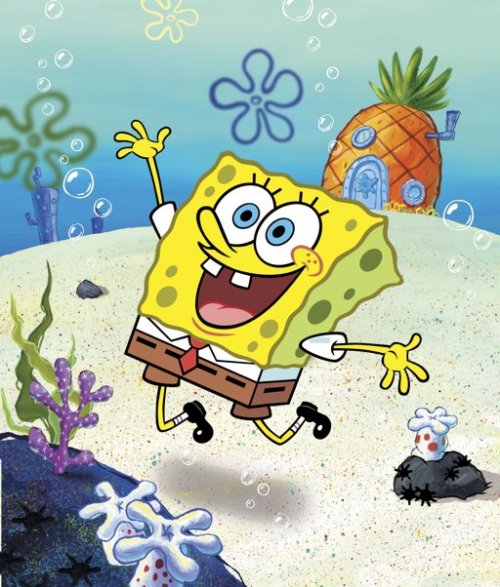CHICAGO (AP) — The cartoon character SpongeBob SquarePants is in hot water from a study suggesting that watching just nine minutes of that program can cause short-term attention and learning problems in 4-year-olds.
 |
This undated file image released by Nickelodeon shows a scene from the animated show "SpongeBob SquarePants." The cartoon character is in hot water from a study suggesting that watching just nine minutes of "SpongeBob SquarePants" can cause short-term attention and learning problems in 4-year-olds. (AP) |
The problems were seen in a study of 60 children randomly assigned to either watch "SpongeBob," or the slower-paced PBS cartoon "Caillou" or assigned to draw pictures. Immediately after these nine-minute assignments, the kids took mental function tests; those who had watched "SpongeBob" did measurably worse than the others.
Previous research has linked TV-watching with long-term attention problems in children, but the new study suggests more immediate problems can occur after very little exposure — results that parents of young kids should be alert to, the study authors said.
Kids' cartoon shows typically feature about 22 minutes of action, so watching a full program "could be more detrimental," the researchers speculated, But they said more evidence is needed to confirm that.
The results should be interpreted cautiously because of the study's small size, but the data seem robust and bolster the idea that media exposure is a public health issue, said Dr. Dimitri Christakis. He is a child development specialist at Seattle Children's Hospital who wrote an editorial accompanying the study published online Monday in the journal Pediatrics.
Christakis said parents need to realize that fast-paced programming may not be appropriate for very young children. "What kids watch matters, it's not just how much they watch," he said.
University of Virginia psychology professor Angeline Lillard, the lead author, said Nickelodeon's "SpongeBob" shouldn't be singled out. She found similar problems in kids who watched other fast-paced cartoon programming.
She said parents should realize that young children are compromised in their ability to learn and use self-control immediately after watching such shows. "I wouldn't advise watching such shows on the way to school or any time they're expected to pay attention and learn," she said.
Nickelodeon spokesman David Bittler disputed the findings and said "SpongeBob SquarePants" is aimed at kids aged 6-11, not 4-year-olds.
"Having 60 non-diverse kids, who are not part of the show's targeted (audience), watch nine minutes of programming is questionable methodology and could not possibly provide the basis for any valid findings that parents could trust," he said.
Lillard said 4-year-olds were chosen because that age "is the heart of the period during which you see the most development" in certain self-control abilities. Whether children of other ages would be similarly affected can't be determined from this study
Most kids were white and from middle-class or wealthy families. They were given common mental function tests after watching cartoons or drawing. The SpongeBob kids scored on average 12 points lower than the other two groups, whose scores were nearly identical.
In another test, measuring self-control and impulsiveness, kids were rated on how long they could wait before eating snacks presented when the researcher left the room. "SpongeBob" kids waited about 2 1/2 minutes on average, versus at least four minutes for the other two groups.
The study has several limitations. For one thing, the kids weren't tested before they watched TV. But Lillard said none of the children had diagnosed attention problems and all got similar scores on parent evaluations of their behavior.
<한글기사>
스폰지밥 주의•학습장애 유발 논란
어린이들이 즐겨보는 애니메이션 `스폰지밥 (SpongeBob)'이 단기 주의력 장애나 학습 장애를 일으킬 수 있다는 연구결과가 나와 논란이 일고 있다.
미국 버지니아대 연구팀은 12일 소아학회지에 게재한 논문을 통해 이런 연구결 과를 공개했다.
연구팀은 4세 어린이 60명을 3개팀으로 무작위로 나눈 뒤 1개팀에는 스폰지밥을 , 다른 1개팀에는 느린 속도로 전개되는 애니메이션인 `카이유(Caillou)'를 각 9분 간 보여줬고, 나머지 1개팀 어린이들에게는 종이와 색연필 등을 나눠주고 같은 시간 그림을 그리도록 했다.
정해진 9분이 지나고 나서 실험대상이 된 어린이 전원의 실행기능을 조사하기 위해 주의력, 기억, 문제해결, 만족지연 등 4가지 테스트를 실시했다.
그 결과 스폰지밥을 9분간 본 어린이들이 나머지 두 그룹의 어린이보다 이들 테 스트에서 훨씬 낮은 점수를 기록했다고 연구팀은 밝혔다. 카이유를 본 어린이들과 그림을 그린 어린이들은 비슷한 점수를 보였다.
이와 관련, AP통신은 스폰지밥을 본 아이들이 다른 그룹 아이들보다 12포인트 낮은 점수를 기록했다고 전했다. 또 자기통제 측정에서는 스펀지밥을 본 어린이들은 평균 2분30초를 참는데 그친 반면 나머지 두 그룹 어린이들은 4분간은 참았다.
이번 연구를 이끈 버지니아대 심리학과의 앤젤린 릴러드 교수는 "스폰지밥과 같 은 프로그램을 본 아이들이 학습능력이나 자기통제 능력에 저해가 올 수 있다는 사 실을 부모들이 알아야 한다"고 말했다.
하지만 그는 이는 스폰지밥만의 문제라고 말해서는 안된다면서 빠른 속도로 전개되는 만화를 봤을 때 비슷한 문제들이 나타나는 것을 발견했다고 설명 했다.
그는 "아이들이 학교에 갈 때나 주의를 해서 뭔가 배우려고 할 때에는 이런 프 로그램들을 보여주지 말라고 권하고 싶다"고 말했다.
이에 대해 스폰지밥을 방영하고 있는 어린이 오락채널 니켈로디언측은 이번 연 구결과의 신빙성에 강한 의문을 제기하며 반발했다.
니켈로디언 대변인인 데이비드 비틀러는 스펀지밥의 경우 목표 시청연령은 6∼1 1세 어린이로 4세 어린이들이 아니라고 지적했다.
그는 "타깃 시청연령도 아닌 다양하지 않은 60명의 어린이들에게 이 프로그램을 9분간 보게한 것은 의문이 드는 조사방법으로 부모들이 신뢰할 수 있는 어떤 유효한 연구결과의 기반도 제공하지 못한다"고 주장했다.
..








